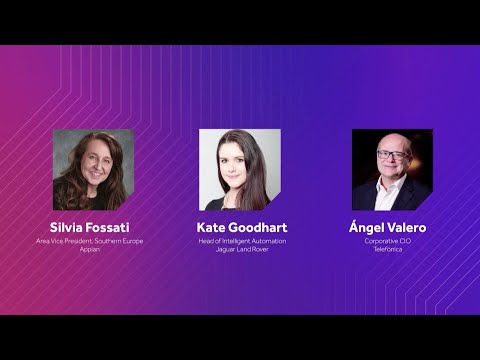Morning Plenary Session: Bringing Business and IT Together to Drive Innovation

- Good morning. Welcome to this panel. I'm really excited to be here and to be able to introduce you to our customer who has candidly accepted to share with us their experience and their journey with Appian. So as a first step, Angel and Kate, I will ask you to introduce yourself, your role and the company you're working for. - Okay. So, hello everybody and thank you, Sylvia, for inviting me to this meeting.
So this is Angel Valero. I am the Corporative CIO of Telefonica and also I am the CIO for the B2B systems of Telefonica Espana, as well. So my main area is first to deliver global services to the company for my CIO corporative role. In order to deliver what we deciding the in the company that is global for the whole thing. One of these things is, for example this process of automation processors that we are talking today And also in the B2B services just to deliver services and systems to the B2B area in order to get revenues and so on.
I suppose that everybody knows Telefonica but I mean Telefonica is a Telco media company. We operate in more than 15 countries, we have more than 40 billions of revenues, eh, more or less and 350 millions of customers around the the world. We operate mainly in four geographies. That is Germany, Spain, Brazil, and is Pan America and also in UK.
We have done, as you notice in the, a joint venture with Liverpool Global like 1702 as we operate as two in the, in the no thing. That's I think - - Okay. - Hi, good morning everyone.
I'm Kate Goodhart. My role is the Head of Intelligent Automation at Jaguar/Land Rover. So I'm responsible for the center of excellence and we utilize a number of automation technologies, including Appian, to really deliver value back to the business. And then in terms of Jaguar/Land Rover as a company we are a luxury automotive company. We make amazing products such as the Range Rover the Defender, the Jaguar brand, and that's what we do.
We sell those in over a hundred countries. - So tele-communication and manufacturing that are two very complex markets with million of very sophisticated process across the whole organization. Can you share with us what are the main challenge and business challenge of your industry? - Okay, I'll try. I think I will summarize that for us the main challenge is to recover our investments, no? What I want to say with this, first of all, in in our in our sector, we are having a reduction of the margins. I suppose many of you have the same phase because of the macroeconomic issues regarding the inflation.
Energy, for example, in Spain, we the increasing of the power that have to pay this is more than 300 millions or euros because of have to maintain all our plants antennas, CPDs and everything. So it's affecting us very much. Of course, we cannot move this price to our customers, no? And the second thing is the we have a price war in the, in telecommunications, in the communications product because we have a lot of low-cost people, companies, that are entering in our market and we as Telefonica are basing on the quality of services but they just go to price, no? And many customer thinks that the price is the only thing and then we cannot up our prices, so we have to, to maintain this kind of worth. For example, again, in Spain we have more than 150 companies of telecommunications.
As you know, you in America, in United States there are only four. So I think that's a, that is very, very difficult to to maintain our quality of services with kind of of competition. And then it's a very regulated market as remembering here in in UK we try to, to join with a company and then the regulation didn't allow us to do it. So again, we cannot do a kind of concentration in order to create more volume and trying to, to get efficiencies, no at the end we have to, to find efficiencies and, and try to to make our processors more efficient. That is the reason that we are working here. And the second point I want to to discuss here is the diversification.
So as we have to, our producer are going down, as you know the voice is going down, the data is is going up. So we are trying to find another areas to combine and sell our services around the telecommunications world. In the B2C segment for example we have moved to the product company, the voice, fixed line and now we move to the customer as every of you. And then we have moved again to the homes.
So we are preparing, we are selling to our customers is moving to the home and we are trying to sell services to the home. For example, we are selling security alarms in the homes based and connected with our networks, trying to sell solar panels. That is, you can, you can laugh at that but is true trying to again to maintain and to and to and to to monitor this sort of panels with our communication.
So we are focusing more around our homes. And in the B2B segment what we have done is to try to open a new space that is based on IT services. And again, IT service, as you already know as well, the margins are not so high as we had in telecommunications, right? Just for in telecommunications we are investing 15% of our revenues in order to maintain just the quality of the service that we have to maintain our clients.
So that is for me the huge impacts. - Thanks, Angel. Kate. - And for us, I think anyone that's in any form of manufacturing will be well aware of the supply chain challenges. We've got such a great demand for our products. We've got a huge order book of cars that we're just really excited to build but making sure that we've got the right parts and their supply chain to fulfill that is a real struggle for us at the moment. And then I think secondly it's an opportunity as well as a challenge is electrification.
So we've made a bold statement for all Jaguars from 2025 are gonna be full electric which is really exciting. We're really proud of that. But that means we've gotta change our manufacturing facilities, we've gotta change our processes and again the supply chain. So making sure that we're ready for that as well is huge for us. - Totally understand.
Angel, Telefonica has been a customer of Appian from many years, - Yes. so you have launched a number of strategic initiative leveraging on Appian. Can you share with us some of this initiative? What has been the business benefit of that? - Okay. We started with, with Appian several years ago.
We started with digitalizing areas that were not digital users convincing. For example, that lawyers, compliance area, data privacy on their area. Then we had tried to do this before with other tools, but we failed.
But with Appian we found a way to do it, no? First of all, because Appian helped us to do this new way of working of agile that everybody knows, I don't know how to explain it, but these kind of people didn't. We are talking about lawyers or something like this. They have to create this agile methods, experience and so on. And for them was not easy to do it, but we we convinced them, we use the method and and we did it. And the point is that they own the the process.
They own the tool and the platform and they are the one who are doing the next sprint where where they're doing the new capabilities and so on. For example, in data lawyer thing we created the process to create, sell, and gross company in a digital way integrated with Electronic Firm and also integrated with Blockchain in order to to do the certificates that has to be approved by local entities, for one, no? That is something that in 3-4 years was impossible to do it in Telefonica now. So they created and then we show the experience and then we move to next step is to incorporate Appian in our core systems. So in our core telecommunications systems. In the B2B segment, the strategy work we have done for transforming our systems was based on what we call "best of brief" approach, you know? So we are cherry-picking the best product that we think for covering our profits. And in the case of the more legacy that is the provision, provision is when you have to do the, the service to to create the, the service and the communications in in a home or whatever, the provision of these things.
We have a very old legacy system. So we decided not to transform them but to create an APA world. And with Appian inside of this we are creating the whole processes around the different products. For example Salesforce for for pre-sales and so on, CRM. And then getting the APAs that we have from these legacy products And then creating end-to-end processes where the users can see all the provisioning thing in one single portal.
They can follow the process where it is and so on, no? And this is huge, huge transforming thing. And this is is something that I think we are going to explore and, and in the future. - Thank you, Angel, and this is very insightful.
I have an additional question for you. You are explaining to us a number of initiative that Telefonica is putting in place as a customer of Appian but Telefonica is also using Appian to deliver and to announce the service that Telefonica is giving to their customer. Can you share something with us about this? - Yes, as I was saying at the beginning in the B2B world, we are diversification regarding IT, no? Initially we started to do this for defending our product, not for defending communication. So we have started to sell digital workplace services to the clients in order to cover the end-to-end thing to sell CPD capabilities, virtual data storage and so on, in order to again, to maintain our thing. But we show an opportunity in order to expand this portfolio of services and we can see that we are able as Telefonica at the technological company that we can create our portfolio with more products, no? And one open space that we can enter is the applications world, no? As you know, we have created a company that is called Telefonica Tech that we are trying to improve and to mobile move these kind of things. In particular in Appian, we also have created a center of excellence for delivering and support our products, our project we have done internally and we can use this in order to share and sell it to other clients.
Even the product that we have done inside Telefonica to sell it to other clients. For example, this kind of of legal thing or the compliance and DPO thing, we can, we can productize and sell it and also to give services to another customers that can can give in the case that they want to ask for us. - Thank Angel. Kate, you are a recent customer of Appian.
Can you share with the audience what has been your first application and business case and your first initiative on Appian and what are you doing now? - Of course, yes. So given this is Appian Europe this word might spark some emotion in the room but the first project that we did was Brexit. So the impact of Brexit for Jaguar/Land Rover was absolutely massive. The sheer volume and complexity of documents that we were gonna have to deal with just to get parts across the border was just amazing or scary to be honest. So initially Jaguar Land Rover thought oh well we'll just hire a huge team of people to sit and churn through those documents. But we said no, let us see if we can help you with a digital solution.
So that's what we did. So it was hard rough but with looking at Appian and a number of other automation tools we've created a workflow package that the tax teams use, the various teams used throughout that process which is quite a vast number of people that that impacts. Our suppliers interact with it, we make sure we've got all the documents in place in the right area, we can push back to the supplies if we haven't got what we need. So we've been able to really make a robust process for that which has been amazing.
And the impact that that's had for us, I mean firstly if we couldn't do that and we could and things we're gonna get stopped at the border the impact for that would be massive. It would stop the manufacturing line. So the actual value of being able to continue that has been massive. Secondly, from a capacity liberation perspective, either we would've had to hire that team of poor people to sit and churn through those documents or people would've been pulled from elsewhere to have to do that. So the fact that that hasn't happened means that those either those people are out there doing more value-add tasks or we didn't have to hire them, hence a cost saving. And then thirdly, because it's such a robust, auditable process that we've been able to build, we can now kind of use the legislation to our advantage and claim some duty payments back.
So when you add all those three together from a financial impact that that's had, it's been in the millions that we've been able to save and that's been kind of agreed with our CFO and signed off by finance. So that's a genuine recognized saving that we've been able to make back to the business with that solution. - Wow, this is really impressive. So following the the, the success of this Brexit initiative what other project you are now going on and in place? - Yeah, there's many.
So given the success of that and the visibility that it's had, it's opened a lot of doors for us. So again, I mentioned that the stock supply chain is a huge issue for us. So again, we've created a workflow tool for as soon as there's an issue flagged from say one of the buyers, from a supplier, they can raise that it's tracked through the automation and that enables us to react better and plan better based on that proper workflow solution. So that's in supply chain.
We're also looking at vendor management in the manufacturing side in quality. We're really excited about more things that we can do. - Good, good. Very good to hear. And now looking at the future and Angel I'm coming back to you looking at your near term business priority, where you are looking at and what do you think Appian can be leveraged for your near term business priority? - Okay, I will say three things, I think.
First this unknowns of data fabric. I've heard this, this meeting, I'm very very happy to hear it because one of the challenges that we have in Telefonica when we enter in the core processes is how to manage this amount of data that we have no example, we have 30,000 of of things every day have to move. So we have to replicate a lot of things a lot of data and that is something that we hope that we excited regarding this announcement that you have done. So I hope that after being tied into Appian, especially that I am very very interested in that as well, no? The second thing is to move ahead our processes to the customer, no? In order to create an end-to-end processes incorporating the profession of the customer inside our processes, no? I think that is something that we have to work on.
We are hoping that using portals perhaps is going to help us in order to do this because many, many times, we are not just our process that we have to combine with the customer in order this open world of open IPIs they want to consume, for example, we are in the network as a service world in this moment in Telefonica or in in the communications world. In order to consume the services but not the whole thing. For example, you want to consume the quality of the services of the network or whatever thing, no? I think these kind of things has to come in order to create that end-to-end processes in an end-to-end thing. And the third thing is everybody is regard the talent. So how Appian is going to help us in order to create more talent in our companies in the center of training and so on. Because I think something that everybody know here.
- Thanks Angel. Kate, what about you? - Yeah, we're really excited. So from this initial successes that we've had we've got a really strong pipeline of future opportunities for Appian and for us to really leverage the technology. So as mentioned, across quality, across compliance all across the business we've been really successful with RPA and now we're looking to take that to the next level with the more intelligent capabilities. And then I think in order to do that at scale, we're gonna start exploring the citizen development or the federated model.
Up until now it's been very controlled. We'd like to keep ahold of it but the demand is there. So we're really excited about taking it to that next step.
- Thank you. I have one last question for you Kate is what you have started the journey with Appian recently. So any advice for people starting the journey with Appian? - I think very similar to some of the things that were mentioned yesterday around start with an area where you've got that business buy in. Having that is invaluable and then don't focus on the tech side of it.
Of course that's very cool and very exciting but really bring it back to that business value. What is the benefit that you are gonna give back through that automation or through that workflow tool? And then kind of put a number on it. Don't be scared to put a number on it and then use that to then push it out to the business. And what I've found has been quite helpful is try and spark that competition between departments.
So for example, if when we had that in finance and in the tax teams then the purchasing teams are like, "oh what's that?" And then start to kind of create that competition of well they're using it, I want to use it. That's been really helpful for us. - Angel, I have also a last question for you.
How do you see the future of process automation that you are in already from a quite a long time? - I know, I dunno, I guessing here is I think that we will come in the process as a service, no? Everything is as a service. So I think the future we will have process as a service in order that we are going to consume the process as we need, not every time. So we don't create a process for the whole thing 24,5/7 but perhaps we start the process, we use it and they close and then the price revenue and so on could be changing. But I mean this as every industry moving in that way I think the process of automation is moving as well.
(Angel laughs) - Angel, Kate, thank you very much for being with us today and for sharing your experience. I'm sure the audience found it very useful. Thanks again.
2022-12-13 08:41


